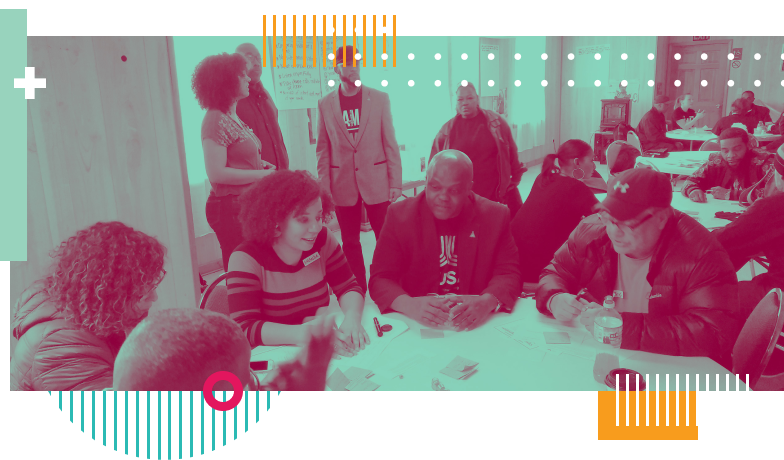
Nationally, we suffer from a lack of strategic vision about how to divest from jails and prisons and reinvest in the health and safety of our communities. Our Just Cities Lab focuses on introducing and normalizing alternatives to punitive justice. We convene change-makers from Detroit and elsewhere who are, for example, experimenting with restorative justice approaches to architecture and urban planning, “flipping” prisons into community support centers, and implementing justice reinvestment solutions through policy change. We incubate and amplify Just City solutions that will ripple far beyond Detroit.
The issues facing our clients and communities can at times feel overwhelming, and we believe that in order to find solutions we must take a 360º approach. Divest/Invest is one of the frameworks we use to approach our advocacy work. It is our belief that we must remove all investments and collective energy from structures that harm our communities and invest in resources that will uplift, heal and provide genuine community safety. We use this framework because we believe that we must build the world we envision as we dismantle systems of oppression.
In September 2018, the Detroit Justice Center joined forces with a host of community partners to put together a Restorative Justice Youth Design Summit, where young people in Detroit were asked what they would do with the money that Wayne County and Rock Ventures are spending to build two new jails in the city. Along with our colleagues at Designing Spaces + Designing Justice, we have put together this report detailing the process along with the outcomes of the summit. The report highlights the young people’s visions for what it would take to create truly safe communities.
Watch teens discuss alternatives to a new jail at our recent Restorative Justice Youth Design Summit.
The issues facing our clients and communities can at times feel overwhelming, and we believe that in order to find solutions we must take a 360º approach. We engage with individual legal needs daily while also advocating for a more holistic approach to systemic change. Divest/Invest is one of the frameworks we use to approach our advocacy work. It is our belief that we must remove all investments and collective energy from structures that harm our communities and invest in resources that will uplift, heal and provide genuine community safety. We use this framework because we believe that we must build the world we envision as we dismantle systems of oppression.
Locally, we work alongside No New Jails Detroit and have hosted workshops with the Participatory Budgeting Project to develop strategies for divesting from incarceration. Amanda Alexander, founding Executive Director of the Detroit Justice Center, was also appointed to the Michigan Joint Task Force on Jails and Pretrial Incarceration with the goal of creating better policy solutions to mass incarceration. To learn more about how this approach can be applied to a number of focus areas, we recommend reading this helpful guide put together by Funders For Justice.
All over the country we are seeing the criminalization of homelessness rather than investment housing. Putting an unhoused person in jail only makes it that much harder for someone to do things that could help stabilize their lives when they are released such as getting a job or accessing any mental health or addiction treatment they may need.
When it comes to those who need mental health treatment, it’s easier to find a jail bed than it is to find a bed in a therapeutic care facility in Michigan. Too often people who need help with mental illness are at the mercy of the police and courts, which means they are much more likely to end up incarcerated than they are to get treatment.
The same is true for those who are dealing with addiction. Again, many people who need addiction treatment end up incarcerated. People who either cannot afford or do not have the ability to access treatment programs should not be treated like criminals. Untreated addiction harms families and communities. But putting those who need treatment in jail compounds the trauma and hardship these families and communities face.
We need clear policy strategies for community reinvestment. It’s not enough to reduce jail populations; we need to shift our funding away from police, courts, and jails and towards the things we so desperately need — like mental health services, substance use treatment, and affordable housing.
Across the state, Michiganders are calling for — and organizing hard for — resources to truly care for the health and well-being of their communities. Like all real change, it’s people power that will make that shift happen. Transformative change happens when groups being crushed by a system force those in power to change it.